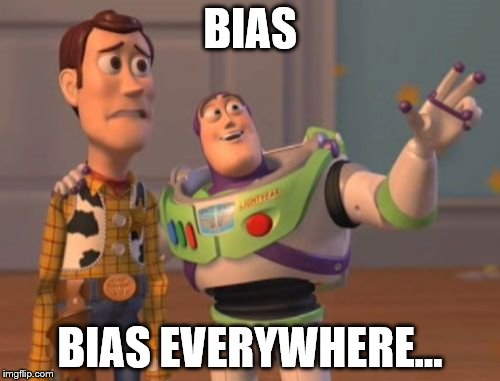by Michael Rectenwald

Recent attempts to address bias and stereotypes – including bias training in the workplace, bias reporting hotlines on campuses, and warnings about bias and racism in movies – are not only ineffective, they make matters worse.
Bias training creates workplace tensions where they didn’t exist, while also reducing employment opportunities for those it aims to protect. The encouragement of bias reporting on college campuses restricts free speech, encourages hoaxes, and “institutionalizes surveillance.” Movie warnings posted by entertainment companies condescend to their viewers, treating them like bigots and racists foaming at the mouth at the prospect of seeing outdated depictions of racial and other stereotypes.
Bias Training
With revenues of approximately of $8 billion per year, the bias training industry is big business. Nevertheless, the enterprise has been considered highly ineffective, even dangerous.
The notion of implicit bias gained currency with the introduction of the Implicit Association Test that supposedly measures the prevalence of “implicit bias.” But the test has failed to predict racist or other bigoted behavior. Its predictive failure has led scholars to doubt whether implicit bias can even be measured, let alone be correlated with behavior.
It is little wonder, then, that workplace bias training has produced such miserable results. Bias training has not only exacerbated workplace tensions, it has even reduced the employment opportunities of those it sought to protect. “That’s right,” remarks Time columnist Joanne Lipman, drawing on studies by Harvard organizational sociology professor Frank Dobbin and others; “companies that introduced diversity training would actually employ more women and black men today if they had never had diversity training at all.”
Bias Reporting Hotlines
Responding to a supposedly steep rise in hate crimes and incidences of alleged bias on campuses, at least 260 colleges and universities across the US have instituted bias reporting hotlines, with such reports reviewed by response teams (BRTs) established to adjudicate reported cases of “bias incidences” perpetrated on minorities.
But bias reporting hotlines have caused problems of their own, including posing threats to constitutionally-protected speech, apparently encouraging a spate of “racist” hoaxes and, with BRTs operating behind closed doors and without transparency, producing a chilling effect on campuses. Bias reporting hotlines and BRTs, as well as the prevalence of no-platforming by activists, have combined to create free speech crises in American academe.
Warnings on Films
The film industry, most recently Disney, has also gotten in on the action, posting warnings on old films indicating that the movies include “outdated cultural depictions” of minorities. With the introduction of its new streaming service, Disney-Plus, several old Disney movie cartoons warn viewers of these outdated depictions, which some critics found insufficient. But even Disney’s warning is pedantic and insulting to viewers, who must now be cudgeled by their PC overlords before watching a cartoon.
The Bottom Line
The problem with such bias-reducing methods is not that bias, stereotypes, bigotry, or racism do not exist, but rather that such institutional means for supposedly counteracting them actually produce more of what they intend to eradicate. In berating the would-be racist or bigot in advance, they produce resentment for the minority populations that they pretend to protect. Nothing is more effective for generating racism than anti-racism programming.
That’s because these anti-bias, anti-racism, anti-bigotry mechanisms and methods always are behind the real trends in culture and society and are likewise redundant. The message they convey to the supposed racist or bigot is that he or she must nevertheless be monitored, reported-on, and reminded of what racists they really are, even if only unconsciously. Is it any wonder that resentment for such liberal elitism has blossomed in the US?
First published in RT.
By Michael Rectenwald, author of nine books, including the most recent, Google Archipelago. He was Professor of Liberal Arts at NYU from 2008 through 2019.
- Like
- Digg
- Del
- Tumblr
- VKontakte
- Buffer
- Love This
- Odnoklassniki
- Meneame
- Blogger
- Amazon
- Yahoo Mail
- Gmail
- AOL
- Newsvine
- HackerNews
- Evernote
- MySpace
- Mail.ru
- Viadeo
- Line
- Comments
- Yummly
- SMS
- Viber
- Telegram
- Subscribe
- Skype
- Facebook Messenger
- Kakao
- LiveJournal
- Yammer
- Edgar
- Fintel
- Mix
- Instapaper
- Copy Link






